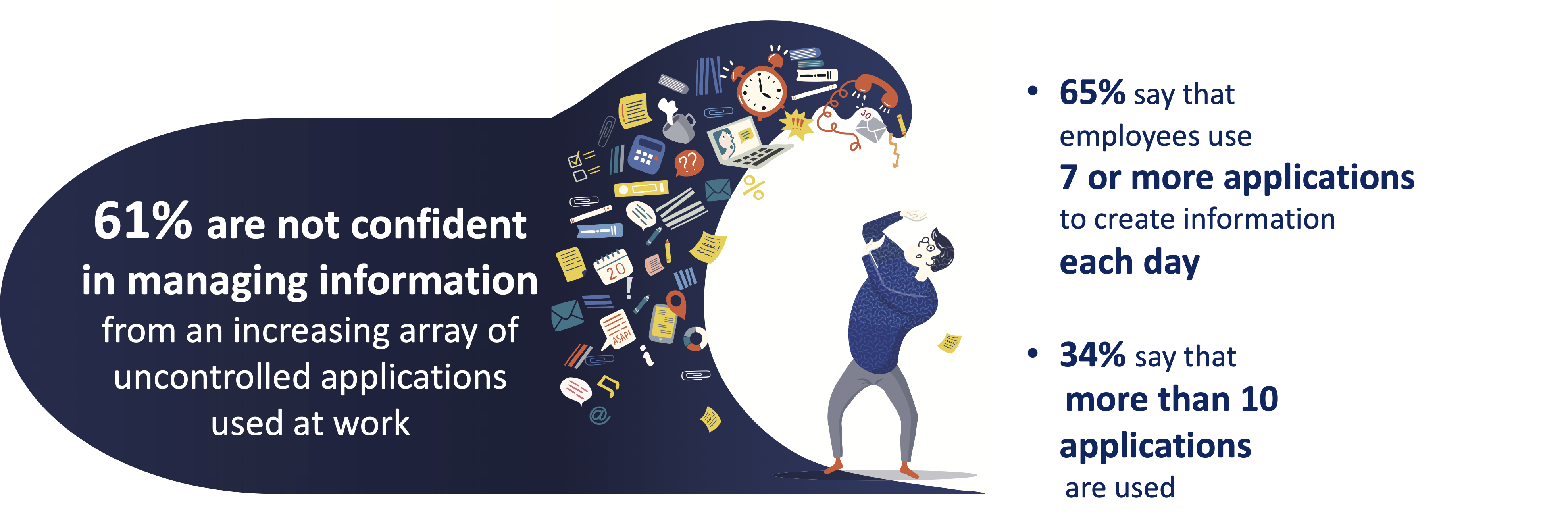Australian businesses at risk due to poor information governance

The challenges of managing information in complex networked environments is increasing, Information Governance & IMaaS Survey, 2023
In summary
- A new survey undertaken by Swinburne and Astral Consulting Services has found that Australian businesses are at risk due to the overwhelming increase in data that organisations create daily
- More than a third of those surveyed said their organisation’s current progress towards implementing information governance was poor
- The survey is part of a research project to explore how changes to enterprise information management practice can lead change in information governance to meet current and future challenges
The surge of high-profile Australian data breaches – such as those at Optus and Medibank – has highlighted the importance of identifying and protecting personal data.
A new survey undertaken by Swinburne University of Technology and Astral Consulting Services has found that Australian businesses are at risk due to the overwhelming increase in data that organisations create daily.
More than a third of those surveyed said their organisation’s current progress towards implementing information governance was poor overall, despite 89 per cent of participating organisations recognising the importance of a formal approach to information.
.“The last decade has generated more documents and records than any previous decade of human activity,” says co-leader of the project, Swinburne researcher Dr Paul Scifleet.
“Yet, at the same time, these records are seen as less reliable, retrievable and accessible than ever before. The volume of information and the rate of growth is simply too large and rapid to rely on traditional methods of information management.”
Other key findings include:
· 61 per cent of employees are not confident managing the breadth and depth of information available to them
· Nearly two-thirds of employees use seven or more applications every day to create and store information, with more than one-third reporting the use of 10 applications or more.
The survey of over 100 information management professionals is part of an industry-shaping research project to explore how changes to enterprise information management practice can lead change in information governance to meet current and future challenges.
The collaborative research project, supported by a Department of Industry, Science and Resources, Innovations Connection Grant, aims to better understand the changing role of information governance and develop new information management cloud technologies and services for businesses.
“The challenges faced in managing and disseminating the ever-increasing volume and complexity of information have never been greater than in today’s highly paced business environments,” says Astral Managing Director Marie Felsbourg.
Astral is a long-term Swinburne partner and currently hosts four Swinburne interns and two industry-based PhD projects as part of the Australian Research Council’s Industrial Transformation Training Centre for Information Resilience (CIRES).
The CIRES initiative is a collaboration between the technology industry, researchers and end-users to help develop a new workforce capable of creating, managing and protecting agile data pipelines.
The researchers are investigating how the changing patterns of digital business, including hybrid work, are changing the function of information governance and how artificial intelligence can be applied to improve the protection of vitial business information..
“Every business is now a distributed workplace, dependent on information sharing. The communication of data and information is a critical asset, which urgently requires improved management to reduce vulnerabilities, limit exposure to cyber security attacks and ensure business continuity,” Dr Scifleet says.
“It is time to ask new questions about the values, rules and parameters under which information will be managed, and to shift the focus from assurance and compliance to greater accountability, trust and responsibility,”
Swinburne and Astral are developing both strategic and technical solutions and prototyping of new information management service models is now well advanced.
-
Media Enquiries
Related articles
-

- Technology
- Science
- Engineering
How entrepreneurship saved Aussie lives when COVID-19 hit
Swinburne alum Jefferson Harcourt spearheaded the rapid development of thousands of ventilators early in the COVID-19 pandemic, saving countless lives
Friday 04 November 2022 -

- University
Swinburne early entry program supports disrupted Year 12 students
An early entry program at Swinburne is supporting secondary students affected by the COVID-19 situation during their 2020 studies.Tuesday 16 June 2020 -

- Business
Surviving a crisis: what Virgin Australia staff can learn from ex-Ansett workers
The experience of ex-Ansett staff may offer clues on how Virgin Australia employees can cope as the airline is placed under external administrators.Monday 18 May 2020 -

- Business
Forget work-life balance – it’s all about integration in the age of COVID-19
The idea of work-life balance caught on the 1980s. The COVD-19 pandemic shows we need to replace it with a more integrated approach.Monday 18 May 2020 -

- Business
Don’t blame COVID-19: Target’s decline is part of a deeper trend
Retail and marketing expert, Dr Jason Pallant suggests that Target's decline in sales is not entirely due to the impacts of COVID-19Monday 25 May 2020

